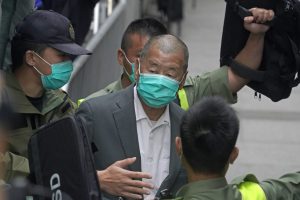Pro-democracy Hong Kong publisher Jimmy Lai was found guilty Tuesday on two fraud charges related to lease violations, the latest in a series of prosecutions apparently aimed at punishing him for his past activism.
Lai was arrested during a crackdown on the pro-democracy movement following widespread protests in 2019 and under the city’s sweeping Beijing-imposed National Security Law. He is already serving a 20-month sentence for his role in unauthorized assemblies.
His media company, Next Digital, published the now-shuttered Apple Daily, Hong Kong’s last pro-democracy newspaper.
Lai also faces collusion charges under the National Security Law and a separate sedition charge. His former colleague, Wong Wai-keung, was also convicted Tuesday on a single charge of fraud.
Lai and two former executives at his company were charged with fraud for subletting part of the office space to a secretarial firm, which was also controlled by Lai, between 2016 and 2020. Their move allegedly violated lease agreements with the Hong Kong Science and Technology Parks Corp. The second fraud count was for letting the same firm use the media outlet’s office space in alleged breach of lease agreements from 1998 and 2015.
District Court Judge Stanley Chan Kwong-chi said the firm’s business did not conform with what was stipulated in the lease agreements, and ruled that Lai had hidden the fact that the company was occupying space in the building. He said he did not believe Lai had forgotten the business was using the office.
One of the executives, Royston Chow, made a deal earlier this year to help with Lai’s and Wong’s prosecution in exchange for exemption from criminal liability.
Lawyers for Lai are asking the United Nations to investigate his imprisonment and multiple criminal charges as “legal harassment” to punish him for speaking out.
Armed with the National Security Law, prosecutors have brought cases against people for clapping in court, sentenced five speech therapists to nearly two years in prison for their role in the publication of children’s books deemed seditious, and put on trial a 90-year-old Catholic cardinal and five others accused of failing to register a now-defunct fund set up to assist people arrested in the mass anti-government protests three years ago.
That has damaged faith in the future of the bustling bastion of finance, with increasing numbers of young professionals responding to the shrinking freedoms by moving abroad.
Electoral reforms have ensured that only those deemed to be “patriots” by Beijing serve in the city’s legislature. Over the summer China installed John Lee, a career security official, as the city’s new chief executive.
Separately, a mainland Chinese man was arrested for allegedly posting three signs carrying “seditious” words at the protest zone of the city’s legislative complex on October 15, police said Tuesday. China’s twice-a-decade Communist Party congress began the next day.
Some wordings on the posters, which were generally about COVID-19 restrictions, were intended to incite others to hate or despise the central government or leaders of the central government, said Lo Yin-lam, chief inspector of Hong Kong Island’s regional public order event investigation team. Lo did not elaborate on the wordings that had been used.
Local newspaper Ming Pao said the content of the posters was linked to a protest at Beijing’s Sitong Bridge, where someone hung banners calling for freedom and not COVID-19 lockdowns days before the congress opened.
National security police also arrested a Hong Kong man accused of participating in terrorist activities.
Police said an investigation showed the 22-year-old man was linked to several local crime organizations. He was accused of providing financial support to a group suspected of involvement in bombmaking plans and other terrorist activities.

































